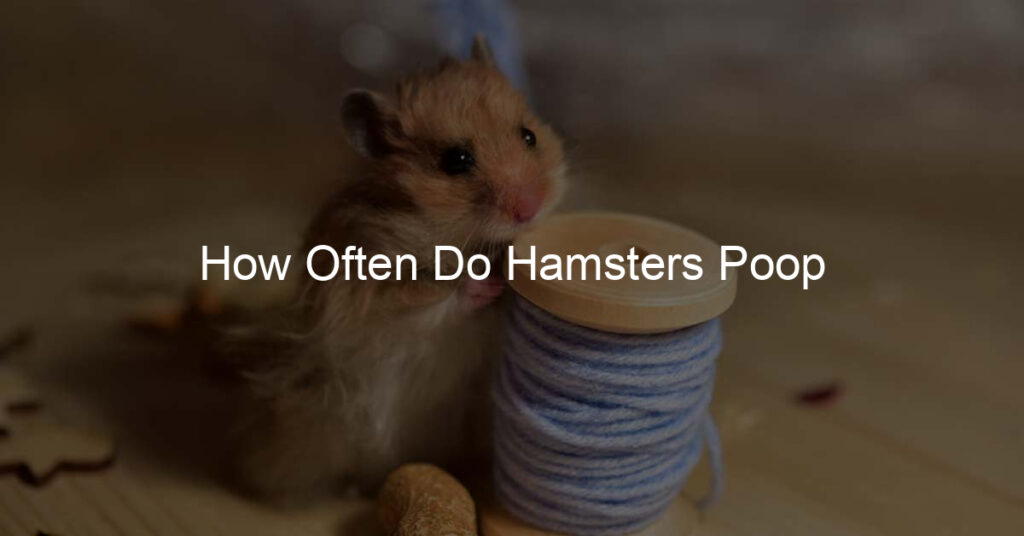For anyone who has ever owned a hamster, one of the key questions is always “how often do they poop?” After all, no one wants to be cleaning up after their furry friend constantly. Luckily, hamsters are pretty tidy creatures and usually only need a little bit of assistance in keeping their space clean. Here’s a look at how often hamsters typically poop and what you can do to keep things tidy.
1. The average hamster produces about 40 pellets of poop per day.
2. Hamsters tend to poop more when they’re active, so if you see your hamster running around a lot, it’s likely he’s going to produce more waste.
3. It’s important to keep your hamster’s cage clean and free of waste to prevent health problems.
4. If you notice your hamster is pooping less than usual, it could be a sign of illness and you should take him to the vet.
5. Some people like to collect their hamster’s poop as fertilizer for plants – it’s up to you whether or not you want to do this!
Do hamsters poop and pee a lot?
Hamsters are known to be relatively clean animals and generally don’t make a mess with their waste. So when it comes to pooping and peeing, many people wonder if these little creatures create a lot of waste. Although hamsters do produce quite a bit of poop, they’re actually quite tidy about it given their size. They usually section off an area of their cage as their bathroom, so most of the mess stays in one spot.
As for peeing, hamsters usually mark territories around their cages which involves some trace amounts of pee on items like toys and food dishes. So, you don’t have to worry about dealing with huge piles of hamster poop and messes, because they are capable of keeping things relatively clean.
How often should I clean hamster poop?
Hamster poop is pretty easy to clean up and should be done on a daily basis. Even though it’s not a pleasant task, it’s important to make sure that you keep your hammies area smelling fresh. The best way to do this is to spot-clean the cage multiple times each day.
Additionally, you should do a deep cleaning at least once or twice a week in order to keep the living space free of bacteria. By doing regular cleanings of your hamster’s space, you can ensure that they are happy and healthy!
How long can a hamster go without pooping?
It can be a little concerning if your pet hamster hasn’t pooped for a couple of days. But don’t worry just yet — hamsters can typically go up to two weeks without pooping! That being said, if you do notice that your hamster has been uncharacteristically quiet and not eating much, it might be worth speaking to a vet as this could indicate an underlying health issue.
Generally, however, hamsters are quite independent critters and will take care of their business in due time. Just make sure to keep their environment clean and provide plenty of fresh food and water!
Do hamsters poop in one spot?
It’s well known that hamsters are pretty cute and loveable–and messy! Not only do they need constant cleaning of their cage, but hamsters also often have an area inside their habitat that they typically use for poop duty. While this isn’t true for all hamsters, some animals exhibit this behavior by instinctually picking one spot to go to the bathroom in.
This little potty area could be a corner or some other designated space where your hamster does its business on a regular basis. Being mindful of this behavior can help keep your pet’s environs tidy and make cleanup easier for you as well!
What helps a hamster poop?
Keeping a hamster as a pet can be a whole lot of fun, but an issue that most owners experience at some point is figuring out how to help their pet go Number Two. Fortunately, there are several treatments that can get things moving in the right direction – for starters, lots of fresh, high-fiber vegetables like carrots and cilantro, along with daily exercise to keep their digestive system going. Another fun solution is ‘hamster wheel salads’: offering your furry friend a mix of veggies like red peppers and shredded kale while they’re running around in their wheel.
That way they get their exercise while also absorbing the nutritional benefits that these foods offer. And if all else fails? A vet visit might be the solution since your beloved hammy might need supplements or other medications to help keep them going strong.
Let’s wrap it up!
Taking care of a hamster’s toileting needs isn’t terribly difficult, as long as you stay on top of it. Cleaning their soiled bedding an average of once every one to two days is recommended, as this will not only help keep the smell at bay but also ensure your little furball stays healthy and happy. To avoid their waste being scattered around the cage, providing them with plenty of hay or shredded paper can help encourage them to use the same area for pooping and peeing.
If your hamster is ever having trouble passing waste normally, special types of food such as cooked beans can be provided to aid in getting things moving again. Taking good care of your pet’s toileting needs may not be the most glamorous chore associated with owning a hamster, but it’s one that’s essential to keeping them in peak condition!








